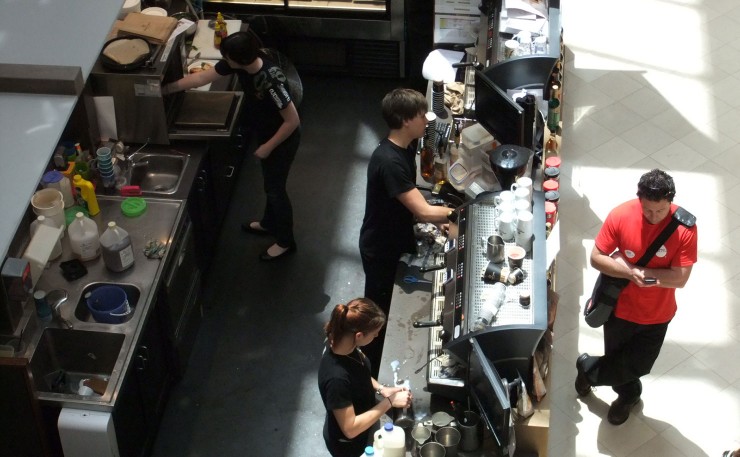The Productivity Commission has endorsed a ‘two-tier’ system of penalty rates with the release of a draft report of its sweeping inquiry into the workplace relations system, requested by the Abbott government.
The move has been met with scorn by the labour movement and the Greens, but cautiously welcomed by the Employment Minister who’s refusing to comment in detail until the final report is released in November.
Earlier this year the government refused to direct the Productivity Commission to stop looking at penalty rates, although Employment Minister Eric Abetz has ruled out any changes before the 2016 election.
Commenting on the draft report Abetz said its findings are “consistent with the government’s stated approach to penalty rates; that it is not for government to set or change penalty rates”.
But the Secretary of the Australian Council of Trade Unions, Dave Oliver, said key recommendations amount to “a pay cut for thousands of Australians who work in restaurants, cafes and shops around the country”.
It’s a position backed by Labor which said it will “never support a two-tier penalty rate system that would leave millions of Australian workers worse off”.
While the draft report did not recommend the abolition of penalty rates – which should come as a relief to the agitated union movement – it did suggest that “Sunday penalty rates for cafes, hospitality, entertainment, restaurants and retailing should be aligned with [lower]Saturday penalty rates”.
Shadow Employment Minister Brendan O’Connor said that “the Abbott Government must immediately rule out” this change or risk confirming widespread suspicions that the Productivity Commission review is being used as a “backdoor” to diminish workers’ rights.
“An adoption of this two-tier system would create two Australias,” O’Connor said. “One Australia where some people are fairly remunerated and another Australia where there is a working poor who are unable to sustain a modest, decent standard of living.”
He said that under an Abbott government a ‘two-tiered’ approach would mean “a slippery slope toward the wholesale cuts to penalty rates across the board”.
The government isn’t going to “draw conclusions based on this draft report”, according to Abetz, who noted that a number of the Commission’s draft recommendations “align with those made by the review of the Fair Work Act commissioned by Bill Shorten when he was Workplace Relations Minister but not implemented”.
“Once the final report has been released, the government will carefully consider all recommendations and those that [it]would seek to implement will be taken to the 2016 election to seek the endorsement of the Australian people,” Abetz said.

The Australian Council of Trade Unions was quick to argue that “there is no evidence to show that cutting penalty rates increases employment or productivity,” instead claiming any reduction would “simply [be]a raid on people’s wages that will create an underclass of working poor”.
“The gap between the minimum wage and average wages is currently the widest on record yet the Productivity Commission recommends using this as the starting point for future minimum wage increases, linking those increases to productivity and cutting this modest increase even further during high unemployment,” a spokesperson said.
While the Commission has recommended some changes to the system it was keen to point out it’s in need of “repair not replacement” because “Australia’s labour market performance and flexibility is relatively good by global standards”.
“Many of the concerns that pervaded historical arrangements have now abated,” the draft report said.
“Strike activity is low, wages are responsive to economic downturns and there are multiple forms of employment arrangements that offer employees and employers flexible options for working.”
The Greens’ spokesperson on Industrial Relations, Adam Bandt, was particularly concerned about the “body blow” that young workers would be dealt if the Commission’s recommended changes to penalty rates were adopted.
“With housing prices so high and wages growing so slowly, young people working in retail and hospitality depend on penalty rates to support themselves and make ends meet,” Bandt said.
“The Greens led the Senate in calling on Tony Abbott to exclude penalty rates and the minimum wage from the Productivity Commission report because we feared he would use it as an excuse to resurrect his attacks on the pay and conditions for Australians at work.
“Tony Abbott ignored the Senate’s call and we now fear the ‘dead, buried and cremated’ WorkChoices legislation is set to rise again under his leadership.”
Other recommendations – including “a new form of agreement, the ‘enterprise contract’, to fill the gap between enterprise agreements and individual contracts” – are now being considered in detail by stakeholders.
The final report is due in November this year.
Donate To New Matilda
New Matilda is a small, independent media outlet. We survive through reader contributions, and never losing a lawsuit. If you got something from this article, giving something back helps us to continue speaking truth to power. Every little bit counts.




